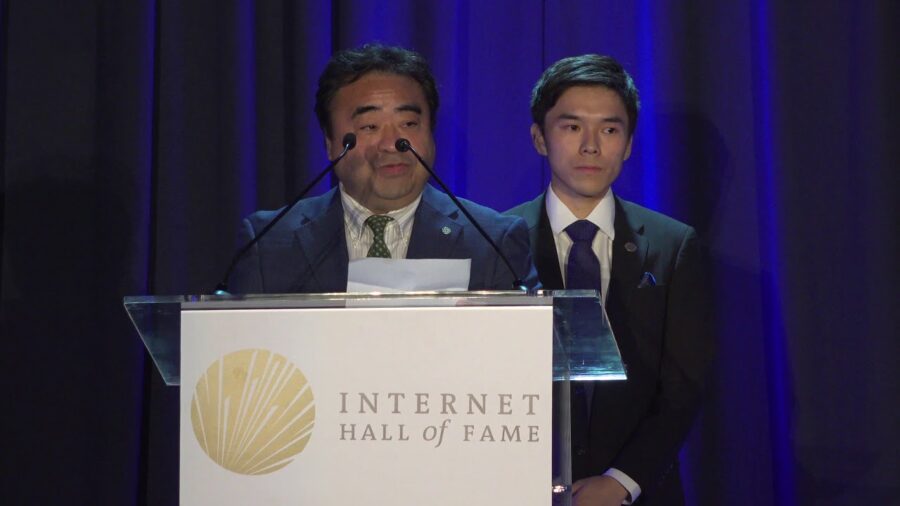Rui Takita: Thank you for the invitation to this ceremoy. I’m very honored to be here. Congratulations to all the inductees. My name is Rui. I’m Suguru Yamaguchi’s son. My father passed away three years ago in 2016, caused by incurable disease. So sorry he can’t be here in person. I’m personally very excited to be here at this special ceremony among all of the Internet legends who built the Internet. I cannot thank my father enough for this special opportunity.
My father was an Internet security researcher working for the Japanese government. He used to fly around the world to train local engineers. I didn’t get to spend too much time with him since he was so busy. But one time, I remember him saying the Internet in Africa is going to develop more and more, so we have to think about Internet security in Africa from the start.
I was born in 1999. Some people like to call my generation the Internet experts. For us, the Internet existed from the moment we were born. And its safety was taken for granted. However, this is all due to the work of my father and his allies speaking to the world, telling them security on the Internet is going to be highly important fifteen years before I was even born.
Today is a memorable day to let the world know about his efforts and achievement in Internet security. I have a message from Jun Murai, known as the father of the Japanese Internet, who was both a great friend and a special colleague of Suguru. And I’d like to call Esaki to read a message from Jun Murai.
Hiroshi Esaki: Thank you very much for the recognition of Professor Suguru Yamaguchi’s work. I bring a special message by Jun Murai, who is the founder of the WIDE Project. He wanted to share with you the four areas of achievement, the activities of Suguru Yamaguchi to be proud by all of us.
First one, he was a pioneer working with me on the computer networks in Japan, starting from JUNET, WIDE, and the global Internet connection starting from 1984.
Second, he was a pioneer connecting the South Asia region by working with leading universities as Asia Internet Interconnection Initiatives (AI3) [pron. “A triple-I”] which celebrates its fifteenth meeting this October, connecting more than fifteen countries and thirty leading universities in Asia.
Third, he was one of the first people who identified the risk of Internet abuses. He founded most of the cybersecurity institutes existing today in Japan, such as JPCERT, and the National Center for Incident Readiness and Strategy for Cybersecurity, called NISC.
Fourth, he sincerely wanted to extend his mission on cybersecurity to everyone on the globe. Therefore he was working in Africa intensively to enhance the collaboration among them with the global cybersecurity community.
His contributions have been far more, and his precious spirit and mission will stay with everybody who worked with him it eternally. I also am very proud that his beloved son Rui is receiving his talk of the inductee of into the Hall of Fame. I suspect by looking at Rui many of the attendees today thought Suguru is back. Please join me and his family to watch over Rui for his bright future with the same braveness to challenge for the future of Suguru.
Congratulations Suguru. I miss you very much.
Jun Murai, founder of the WIDE project, inductee of the Internet Hall of Fame, and pioneer
Thank you.
Takita: Thank you Mr. Murai for the message, and thank you thank you Esaki for reading the message.
Lastly, on behalf of my father I’d like to thank all of the members of JPCERT/CC, START[?], JPNIC, AI3, the Internet Society, the Internet Society of Japan, NICT, and NISC, and the WIDE project. In addition, all the Internet researchers and engineers in their world. Thank you so much for your contributions. I wish all sustain innovation of the Internet. Thank you.
Further Reference
Internet Hall of Fame profile
